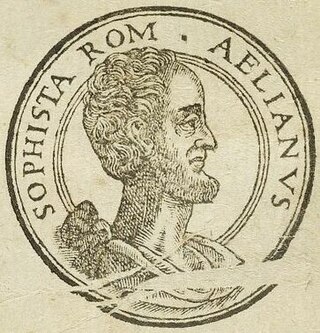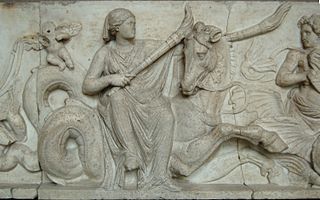
Aelianus Tacticus, also known as Aelian, was a Greek military writer who lived in Rome.

Claudius Aelianus, commonly Aelian, born at Praeneste, was a Roman author and teacher of rhetoric who flourished under Septimius Severus and probably outlived Elagabalus, who died in 222. He spoke Greek so fluently that he was called "honey-tongued" ; Roman-born, he preferred Greek authors, and wrote in a slightly archaizing Greek himself.
In Greek mythology, Astydamea or Astydamia is a name attributed to several individuals:
The Minyades were three Orchomenian (Arcadian) princesses in Greek mythology. These sisters were protagonists of a myth about the perils of neglecting the worship of Dionysus.
In Greek mythology, the Meleagrids were Calydonian princesses as the daughters of Queen Althaea and King Oeneus, and sisters of the hero Meleager.
Bagaudae were groups of peasant insurgents in the later Roman Empire, who arose during the Crisis of the Third Century and persisted until the very end of the Western Empire- particularly in the less-Romanised areas of Gallia and Hispania. They were affected by the depredations of the late Roman state, wealthy landowners, and clerics.

Archelaus I was king of the ancient Greek kingdom of Macedon from 413 to 399 BC. He was a capable and beneficent ruler, known for the sweeping changes he made in state administration, the military, and commerce. By the time that he died, Archelaus had succeeded in converting Macedon into a significantly stronger power. Thucydides credited Archelaus with doing more for his kingdom's military infrastructure than all of his predecessors together.

Doris, in Greek mythology, was a sea goddess. She was one of the 3,000 Oceanids, daughters of the Titans Oceanus and Tethys.
Claudius was the fourth Roman Emperor, reigning from AD 41 to his death.
In Greek mythology, Anapus was god of the river Anapus in eastern Sicily. He was worshiped by the Syracusans, who depicted him as a young man. Anapus was husband to the naiad Cyane, who attempted to dissuade Hades from abducting Persephone, describing how she consented to Anapus' wooing out of love, rather than force.
Adephagia in Greek mythology was the goddess and personification of gluttony.
Pindus, in Greek mythology, was the son of Makednos. He was friend with a snake and when his three brothers killed Pindus, the snake took revenge by killing them.
The Troglodytae, or Troglodyti, were people mentioned in various locations by many ancient Greek and Roman geographers and historians, including Herodotus, Agatharchides, Diodorus Siculus, Strabo, Pliny, Josephus, Tacitus, Claudius Aelianus, Porphyry.
In Greek mythology, Nerites was a minor sea deity, the son of "Old Man of the Sea" Nereus and the Oceanid Doris and brother of the fifty Nereids. He was described as a young boy of stunning beauty. According to Aelian, although Nerites was never mentioned by epic poets such as Homer and Hesiod he was a common figure in the mariners' folklore nevertheless.
In Greek mythology, the name Erymanthus may refer to:

The gens Procilia, sometimes written Procillia, was a minor plebeian family at ancient Rome. Members of this gens are first mentioned during the final century of the Republic, but few of them obtained any position of importance in the Roman state, and they are best known as a result of the historian Procillius, a contemporary of Cicero, whose work has been lost, but who was cited as a source by the Roman antiquarians.
In Greek mythology, Phthia may refer to the following individuals:
In Greek mythology, Doris may refer to two related sea divinities:
Gale is a minor character in Greek mythology. She was a very skillful witch.

Pompilus is a minor character in Greek mythology who incurred the wrath of the god Apollo when he foiled the god's plans as he was chasing the nymph Ocyrhoe.
This page is based on this
Wikipedia article Text is available under the
CC BY-SA 4.0 license; additional terms may apply.
Images, videos and audio are available under their respective licenses.





